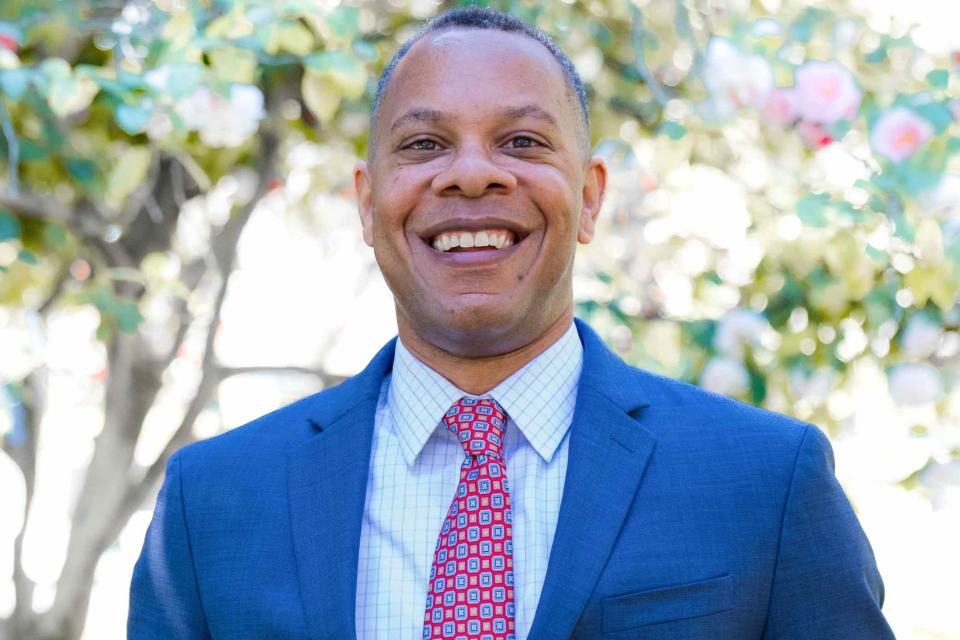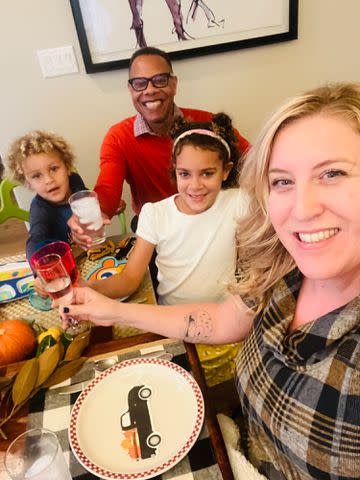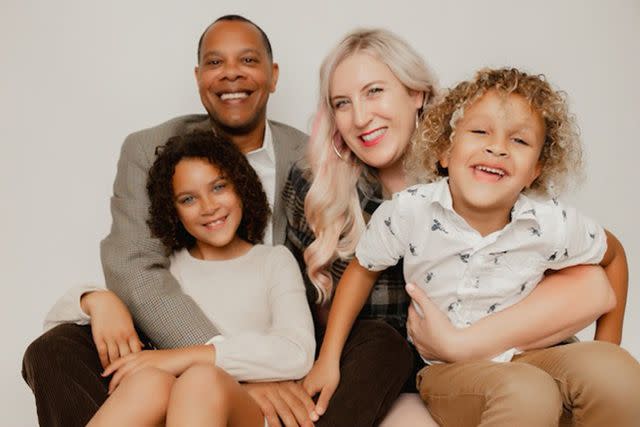I Was Diagnosed with Male Breast Cancer — Here's What to Look For (Exclusive)
Troy Flint, 48, wasn't aware men could get breast cancer until he was diagnosed. Now he's sharing his story to help other men

Rebecca Leroux
Troy Flint, who was diagnosed with male breast cancer in 2023Troy Flint, a father of two living in Sacramento, Calif., was spending a day at the local pool last summer with his kids Ophelia, 8, and Monty, 4, when his daughter pointed to his chest.
"She said, 'Dad, why is one of your nipples sticking out and the other is kind of pushed in?'" Flint, 48, recalls. "I just kind of blew it off. I figured one nipple was maybe cold, and I couldn't really see what she was talking about. We just went on messing around in the pool."
Later that night, Flint, who works for a nonprofit education association, felt around his chest and looked in the mirror. He saw that one of his nipples did indeed look a little inverted. What he would learn a week later would completely shock Flint, his wife Lindsay, and everyone around him. He did indeed have male breast cancer.
This is his story, in his own words, as told to PEOPLE.
I'm 48, but I never considered myself a big cancer risk — particularly for male breast cancer. That wasn't on my radar at all. Had someone said liver cancer, I would have been like well, sure, I did do a lot of drinking when I was younger. But not breast cancer. It was a total shock.
After my daughter pointed out that one of my nipples looked like it was pushed in, I'd absent-mindedly rubbed my hand across my chest, and it felt like one of my nipples was slightly swollen. So I went into the bathroom, and now I'm turning on the light and investigating it and feeling it a bit more. I'm like, uh, this doesn't feel good.
Google says that an inverted nipple is one of the main signs of breast cancer. It also said that men who get it tend to be overweight. Not only am I on the slender side, but I'd just had a checkup and been given a full clean bill of health — the doc even told me I was in great shape for my age. But I was still worried.
When I went back to my doctor to get it looked at, I could see the concern in his eyes. He scheduled me for a mammogram and a sonogram.
The mammogram showed that something looked suspicious, so they ordered a biopsy. But I felt like they could already tell it was something malignant. I had a great rapport with the nurse, and as I got dressed I could see this sad look in her eyes. Maybe I imagined it. But a week later, they confirmed it was cancerous and had spread to my lymph notes.
Now I'm a patient at UC Davis Medical Center, where I'm enrolled in a clinical immunotherapy trial. I think part of the reason I was accepted into this trial was because I'm kind of an anomaly. Usually when a man gets breast cancer, there's some obvious trigger, like a strong family history of cancer or obesity or liver failure from chronic alcoholism, or some sort of environmental or lifestyle or genetic factor. But I didn't hit on any of those red flags.
There's really very little research on male breast cancer because it's so rare — it only counts for 1% of breast cancer cases. And most of the treatments for male breast cancer are extrapolated from what the standard treatments are for women. It's not really customized or tailored for men.

Lindsay Flint
Monty, Troy, Ophelia and Lindsay Flint at home in SacramentoIn this trial, instead of going straight to chemo and then surgery, or doing a surgery first and then having chemo, they start with immunotherapy. Every three weeks I basically get an IV that amplifies my immune system, and then they inject the tumor with something that signals to my immune system to attack that area. Then I get an MRI and blood testing done and have a consultation with either my oncologist or one of the nurses who's working on the trial. And so far, it's encouraging.
The next step is for me to have surgery, and then they'll figure out a chemo plan. So far, I haven't had too many horrible days. I don't have any real serious side effects from the cancer other than I can feel the tumor. It's grown since the initial diagnosis. And there's some irritation and occasionally I'll get a little, I guess you'd call it a shock, that I get from time to time.
But I still work out. I go for runs. I do the Peloton, I pick my kids up, I'm going to work. So I'm in this weird sort of luminal space where I kind of have this serious diagnosis on one side, but on the other side I'm just acting like almost nothing's happening.
Never miss a story — sign up for PEOPLE's free daily newsletter to stay up-to-date on the best of what PEOPLE has to offer, from celebrity news to compelling human interest stories.
Sometimes I try and figure out if I did this to myself. I definitely had a party phase and it's not like I only ever ate sweet potatoes and kale. I think a lot of people do try to blame themselves, just to get a sense of why it's happening. But then I've met people that have even more serious cancers: pancreatic cancer, organ cancers or brain cancers. So while I can't belittle how serious breast cancer is, it could be worse.
My biggest fear was just the fact that I have relatively young kids, just 8 and 4. The possibility of not being there for them to support them, to see them grow up, even just supporting my family financially — you never want your kids to be struggling. So letting them down, letting their life down, that has been the biggest pain I've felt throughout this ordeal.

Lindsay Flint
Troy Flint, his wife Lindsay, and their kids Ophelia, 8, and Monty, 4I know there are support groups, so men can talk about their feelings, especially if they feel that the environment where they're getting care is too feminized. I don't feel that personally. I don't care if I have to wear a pink robe. But I do know when you go into a lot of the places where you're being treated, everyone is, or the vast majority of people, are women. And that may be alienating for some men.
One thing I've learned about male breast cancer, other than the recessed nipple being a sign, is that if you have large breasts in general by male standards, that's something to evaluate. Male breast cancer is too rare to make mammograms or ultrasounds practical as a preventative method, but I would definitely encourage men to do self-exams, especially if cancer runs in your family.
Related: 'I Just Came Out as Someone Who Is Living with Cancer'
My own family has been incredible. My wife Lindsay has been a rock. She's a small business owner who has her own skincare line, Lilac & Flint, and she was the one who came up with the idea for the GoFundMe, which I totally resisted because you don't want to be asking people for things.
As a man, you feel like your first obligation is to provide for or support the family. And my main concern was that this not become a burden on my family or undermine their future in any way. So if that's my first priority, then of course you have to swallow your pride and make decisions that are going to help you stay true to that value. And so I realized that Lindsay was in the right to suggest the crowdfunding, even if it's humbling. There has been an overwhelming response from friends and family.
Lindsay has also helped on the culinary side, making smoothies and helping me stay on a good diet, trying to avoid processed food, added sugars. Obviously, I'm not drinking, so all the things you're supposed to do, but it helps a lot if you have a partner who plays a role.
The kids are doing well and not super aware of what's going on. I'm just really concerned with not traumatizing them. My big hope is that when I do have the surgery, eventually, probably late spring or early summer, is that I bounce back quickly and they're not seeing me in this compromised position and starting to worry. And to be honest, there's some vanity involved too — you don't want your children to see you in a weakened state, and destroy that illusion they have when they're young about their dad, that he's this strong and invincible hero.
I'm hoping for the best, and hoping my story gets some awareness out there. The chances of men getting this men ware low — but if you do catch something, you'll be glad.
Visit GoFundMe to donate to the Flint Family.
For more People news, make sure to sign up for our newsletter!
Read the original article on People.


